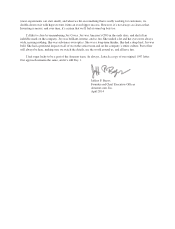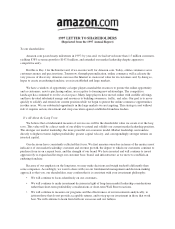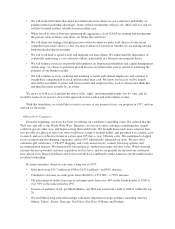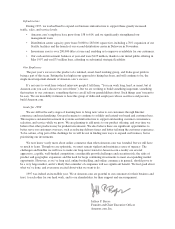Amazon.com 2013 Annual Report Download - page 18
Download and view the complete annual report
Please find page 18 of the 2013 Amazon.com annual report below. You can navigate through the pages in the report by either clicking on the pages listed below, or by using the keyword search tool below to find specific information within the annual report.7
• the success of our geographic, service, and product line expansions;
• the extent to which we finance, and the terms of any such financing for, our current operations and future growth;
• the outcomes of legal proceedings and claims, which may include significant monetary damages or injunctive relief
and could have a material adverse impact on our operating results;
• variations in the mix of products and services we sell;
• variations in our level of merchandise and vendor returns;
• the extent to which we offer free shipping, continue to reduce prices worldwide, and provide additional benefits to
our customers;
• the extent to which we invest in technology and content, fulfillment, and other expense categories;
• increases in the prices of fuel and gasoline, as well as increases in the prices of other energy products and
commodities like paper and packing supplies;
• the extent to which our equity-method investees record significant operating and non-operating items;
• the extent to which operators of the networks between our customers and our websites successfully charge fees to
grant our customers unimpaired and unconstrained access to our online services;
• our ability to collect amounts owed to us when they become due;
• the extent to which use of our services is affected by spyware, viruses, phishing and other spam emails, denial of
service attacks, data theft, computer intrusions, outages, and similar events; and
• terrorist attacks and armed hostilities.
We May Not Be Successful in Our Efforts to Expand into International Market Segments
Our international activities are significant to our revenues and profits, and we plan to further expand internationally. In
certain international market segments, we have relatively little operating experience and may not benefit from any first-to-
market advantages or otherwise succeed. It is costly to establish, develop, and maintain international operations and websites,
and promote our brand internationally. Our international operations may not be profitable on a sustained basis.
In addition to risks described elsewhere in this section, our international sales and operations are subject to a number of
risks, including:
• local economic and political conditions;
• government regulation of e-commerce and other services, electronic devices, and competition, and restrictive
governmental actions (such as trade protection measures, including export duties and quotas and custom duties and
tariffs), nationalization, and restrictions on foreign ownership;
• restrictions on sales or distribution of certain products or services and uncertainty regarding liability for products,
services, and content, including uncertainty as a result of less Internet-friendly legal systems, local laws, lack of legal
precedent, and varying rules, regulations, and practices regarding the physical and digital distribution of media
products and enforcement of intellectual property rights;
• business licensing or certification requirements, such as for imports, exports, web services, and electronic devices;
• limitations on the repatriation and investment of funds and foreign currency exchange restrictions;
• limited fulfillment and technology infrastructure;
• shorter payable and longer receivable cycles and the resultant negative impact on cash flow;
• laws and regulations regarding consumer and data protection, privacy, network security, encryption, payments, and
restrictions on pricing or discounts;
• lower levels of use of the Internet;
• lower levels of consumer spending and fewer opportunities for growth compared to the U.S.;
• lower levels of credit card usage and increased payment risk;
• difficulty in staffing, developing, and managing foreign operations as a result of distance, language, and cultural
differences;
























